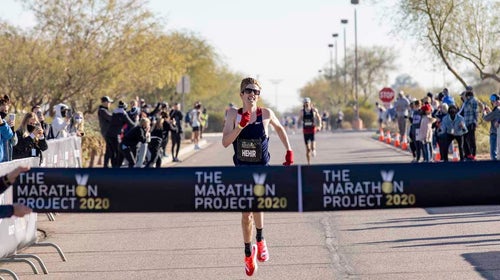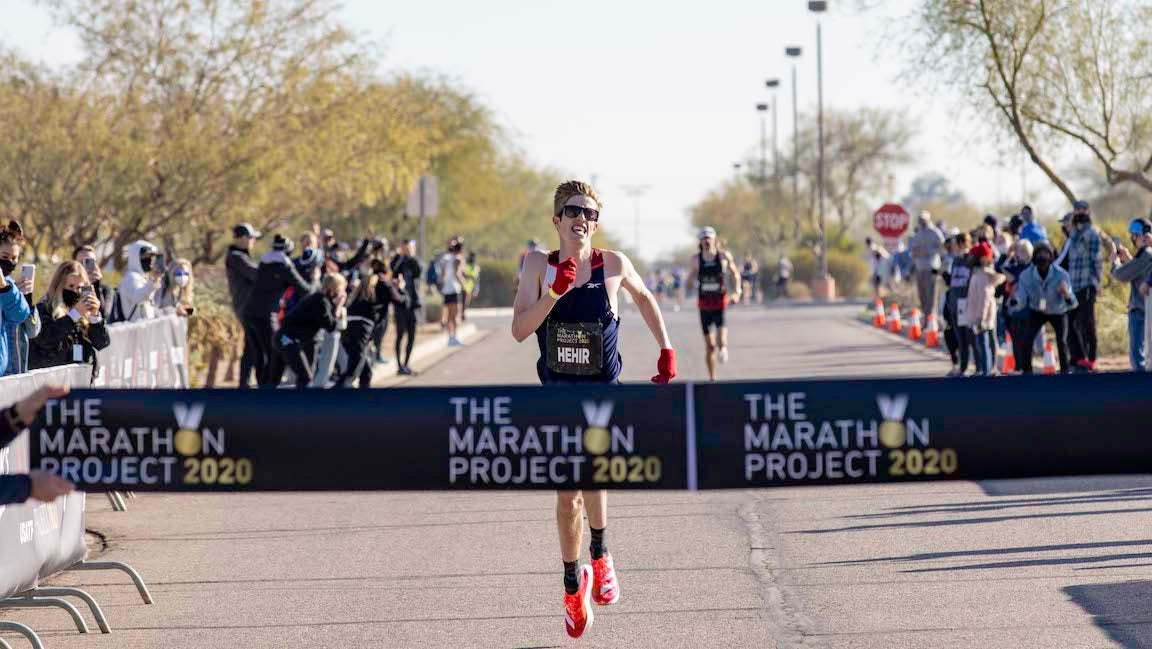You could call Marty Hehir a surprise 2:08:59 winner of Sunday’s beautifully orchestrated Marathon Project race in Chandler, Ariz. Few had picked him for a podium position in the deep men’s field, and his name isn’t widely recognized.
But Hehir, who’s a fourth-year medical student in Philadelphia and turned 28 the day before the marathon, is no flash in the pan or Johnny come lately. He’s paid his dues. Way back in 2010, he finished 14th in Nike’s NXN high-school cross-country race, and in 2015 he placed 9th in the NCAA Div. I Cross Country Championships, leading Syracuse to the team title.
Last February, Hehir was 6th in the Atlanta Marathon Trials race (2:11:29), and he also has track PRs of 13:29 (5000 meters) and 28:08 (10,000). If anything, Sunday’s result may indicate that Hehir has found his best distance in the marathon.

Hehir ran near-perfect pace Sunday, with a first half in 1:04:29 and second half in 1:04:30. His 5K splits to 40K were 15:30, 15:14, 15:11, 15:16, 15:16, 15:17, 15:11, and 15:13. He became the seventh American runner to break 2:09 in the marathon.*
Hehir currently runs for the Reebok Boston Track Club, coached by his former Syracuse mentor Chris Fox, himself a U.S. elite distance runner in the 1980s and 1990s. A second Fox-Reebok runner, Colin Bennie, placed third in the Marathon Project race in 2:09:38.
His training buildup for the Marathon Project:
Hehir believes in being careful not to go over the top in training. He takes his cues from Coach Chris Fox. “He aims to get us ninety-five percent fit, so we don’t burn out before even getting to the start,” Hehir notes. “Our easy Sunday runs, just 40 minutes, embody that mentality.”
His most important workout of the last month:
Four weeks out from their goal marathon, Hehir and training partners do a 10-mile tempo run a few seconds faster per mile than goal pace. In late November, they hit 48:30 for this session. “We practice our fluids and gels en route,” says Hehir. “This run gives us confidence we can run our pace for 26.2 miles.”
His taper:
“The last week, the training is done, and I focus on keeping my mindset positive,” Hehir says. He stays on the same schedule of eating, sleeping, and other activities in an effort to distract himself from the upcoming race. This includes studying for his next medical rotation, but also, for fun: “Reading endless books to my 2.5-year-old.”
Smartest decision after the race had started:
Hehir follows the “conservation of energy” strategy. “There’s nothing to gain from being at the front of a 2+ hour race until the end,” he notes. “I didn’t want to get overzealous out there.” Instead, he settled to the back of the lead group, and “turned my brain off for the first half.”
Surging to the front at mile 23? It wasn’t a pre-planned move. Hehir was just hoping to maintain the 4:55 pace he had been running from the start. “I simply intended to keep the pace honest for a mile or two, and then let someone else take over,” he says. “But when I ran 4:50 and 4:49 for the next two miles, I decided my best option was to stay on the gas and run the tank to empty.”

His marathon successes:
Hehir believes he has always run better when he moved up in distance. He thinks this is mostly psychological, and not something easily improved through training. “I love the thought of being able to will myself onward while others begin to crumble around me,” he says.
The meaning of “Die first, then quit:”
Hehir offered this phrase to the Atlanta Marathon Trials committee as his favorite motivational quote. Explanation: “This is a quote I randomly came across in the last year, and although it’s a touch extreme, it resonates deeply with me. To me it means that until the job at hand is done, not finishing is simply not an option.”
Spending several pre-marathon weeks of his medical training in a Covid-19 ICU ward:
Hehir mentioned this briefly in a pre-marathon press conference last Wednesday, but has since downplayed the experience. He’s not looking for a “hero” label. “As a fourth-year student, my job in ICU was mainly to learn the ropes about treating patients who end up there, and also to offer them a friendly face in a seemingly scary place,” he notes.
The fuzzy future:
No one knows what 2021 will bring for runners and racers, but the best outlook seems a summer or fall return to some degree of normalcy. Hehir says, “I make it a point not to plan too far ahead.” Next year he hopes to run the 10,000 at the U.S. Olympic Track Trials. He was 7th in 2016.
For now, a 2:08:59 feels pretty good. “Earning my place on the US all-time list is a huge validation of my running career,” says Hehir. “And I’d argue there’s still some room to go.”
*American marathoners under 2:09
(best time, record-eligible course)
Khalid Khannouchi, 2:05:38
Galen Rupp, 2:06:07
Ryan Hall, 2:06:17
Dathan Ritzenhein, 2:07:47
Leonard Korir, 2:07:56
Abdi Abdirahman, 2:08:56
Martin Hehir, 2:08:59


